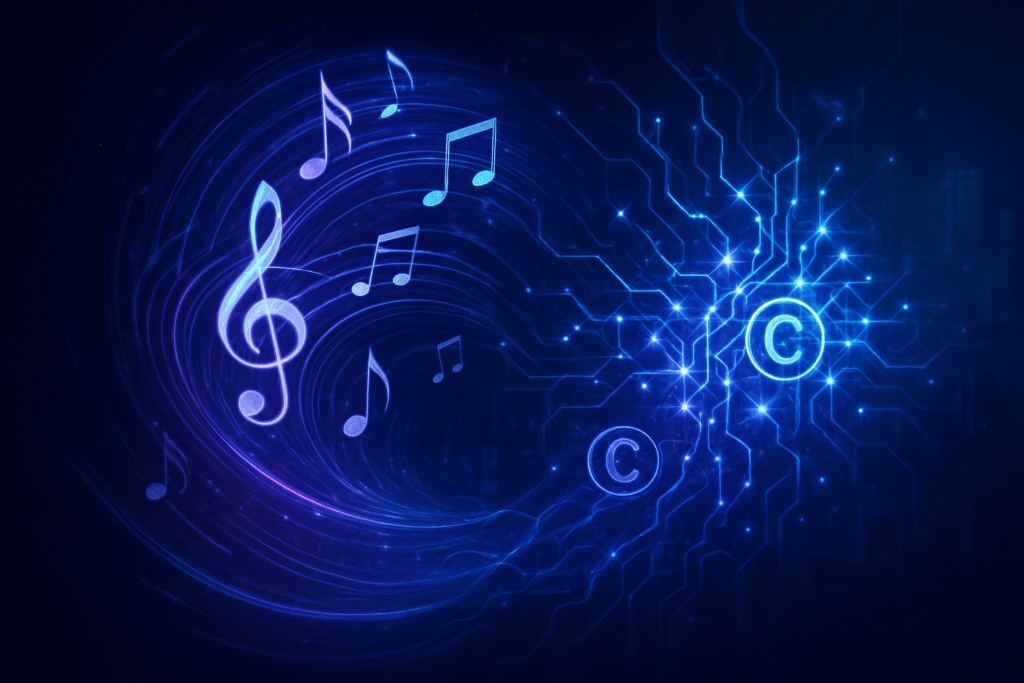
Universal Music Group (NYSE: UMG) and Warner Music Group (NASDAQ: WMG) are reportedly on the cusp of finalizing landmark AI licensing deals with a range of tech firms and artificial intelligence startups. This pivotal move, largely announced around October 2nd and 3rd, 2025, aims to establish a structured framework for compensating music rights holders when their extensive catalogs are utilized to train AI models or to generate new music.
This proactive stance by the major labels is seen as a crucial effort to avoid the financial missteps of the early internet era, which saw the industry struggle with unauthorized digital distribution. These agreements are poised to create the music industry's first major framework for monetizing AI, potentially bringing an end to months of legal disputes and establishing a global precedent for how AI companies compensate creators for their work.
Redefining the AI-Music Nexus: A Shift from Conflict to Collaboration
These new licensing deals represent a significant departure from previous approaches, where many AI developers often scraped vast amounts of copyrighted music from the internet without explicit permission or compensation. Instead of an adversarial relationship characterized by lawsuits (though some are still active, such as those against Suno and Udio), the labels are seeking a collaborative model to integrate AI in a way that protects human artistry and creates new revenue streams. Universal Music Group, for instance, has partnered with AI music company KLAY Vision Inc. to develop a "pioneering commercial ethical foundational model for AI-generated music" that ensures accurate attribution and does not compete with artists' catalogs. Similarly, Warner Music Group has emphasized "responsible AI," insisting on express licenses for any use of its creative works for training AI models or generating new content.
A core component of these negotiations is the proposed payment structure, which mirrors the streaming model. The labels are advocating for micropayments to be triggered for each instance of music usage by AI, whether for training large language models or generating new tracks. This aims to ensure fair compensation for artists and rights holders, moving towards a "per-use" remuneration system.
Crucially, the deals demand robust attribution technology. The music labels are pushing for AI companies to develop sophisticated systems, akin to YouTube's Content ID, to accurately track and identify when their copyrighted music appears in AI outputs. Universal Music Group has explicitly supported ProRata.ai, a company building technology to enable generative AI platforms to attribute contributing content sources and share revenues on a per-use basis. This technological requirement is central to ensuring transparency and facilitating the proposed payment structure.
Initial reactions from the AI research community are mixed but generally optimistic. While some developers might be concerned about increased costs and complexity, the availability of legally sanctioned, high-quality datasets for training AI models is seen as a potential accelerator for innovation in AI music generation. Industry experts believe these agreements will foster a more sustainable ecosystem for AI development in music, reducing legal uncertainties and encouraging responsible innovation, though the technical challenge of accurately attributing highly transformative AI-generated output remains a complex hurdle.
Competitive Ripples: How Licensing Shapes the AI Industry
The formalization of music licensing for AI training is set to redraw the competitive landscape. Companies that secure these licenses, such such as ElevenLabs, Stability AI, Suno, Udio, and Klay Vision, will gain a significant competitive edge due to legally sanctioned access to a rich treasure trove of musical data that unlicensed counterparts lack. This access is essential for developing more sophisticated and ethically sound AI music generation tools, reducing their risk of copyright infringement lawsuits. ElevenLabs, for example, has already inked licensing agreements with rightsholders like Merlin and Kobalt.
Tech giants like Google (NASDAQ: GOOGL) and Spotify (NYSE: SPOT), already deeply involved in music distribution and AI research, stand to significantly benefit. By bolstering their generative AI capabilities across platforms like YouTube and through their AI research divisions, they can integrate AI more deeply into recommendation engines, personalized content creation, and artist tools, further solidifying their market position. Google's MusicLM and other generative models could greatly benefit from access to major label catalogs, while Spotify could enhance its offerings with ethically sourced AI music.
Conversely, AI companies that fail to secure these licenses will be at a severe disadvantage, facing ongoing legal challenges and limited access to the high-quality datasets necessary to remain competitive. This could lead to market consolidation, with larger, well-funded players dominating the "ethical" AI music space, potentially squeezing out smaller startups that cannot afford licensing fees or legal battles, thus creating new barriers to entry.
A major concern revolves around artist compensation and control. While labels will gain new revenue streams, there are fears of "style theft" and questions about whether the benefits will adequately trickle down to individual artists, songwriters, and session musicians. Artists are advocating for transparency, explicit consent for AI training, and fair compensation, pushing to avoid a repeat of the low royalty rates seen in the early days of streaming. Additionally, the rapid and cost-effective nature of generative AI could disrupt the traditional sync licensing model, a significant revenue source for human artists.
Broader Implications: IP, Ethics, and the Future of Creativity
These landmark deals are poised to redefine the relationship between the music industry and AI, reflecting several key trends in the broader AI landscape. They underscore the growing recognition that authoritative, high-quality content is essential for training sophisticated next-generation AI models, moving away from reliance on often unauthorized internet data. This is part of a wider trend of AI companies pursuing structured licensing agreements with various content providers, from news publishers (e.g., Reddit, Shutterstock, Axel Springer) to stock image companies, indicating a broader industry realization that relying on "fair use" for training on copyrighted material is becoming untenable.
The agreements contribute to the development of more ethical AI by establishing a compensated and permission-based system, a direct response to increasing concerns about data privacy, copyright infringement, and the need for transparency in AI training data. This proactive stance, unlike the music industry's initially reactive approach to digital piracy, aims to shape the integration of AI from the outset, transforming a potential threat into a structured opportunity.
However, significant concerns persist. Challenges remain in the enforceability of attribution, especially when AI outputs are highly "transformative" and bear little resemblance to the original training material. The debate over what constitutes an "original" AI creation versus a derivative work will undoubtedly intensify, shaping future copyright law. There are also fears that human artists could be marginalized if AI-generated music floods platforms, devaluing authentic artistry and making it harder for independent artists to compete. The blurring lines of authorship, as AI's capabilities improve, directly challenge traditional notions of originality in copyright law.
Compared to previous AI milestones, this moment is unique in its direct challenge to the very concept of authorship and ownership. While technologies like the printing press and the internet also disrupted intellectual property, generative AI's ability to create new, often indistinguishable-from-human content autonomously questions the basis of human authorship in a more fundamental way. These deals signify a crucial step in adapting intellectual property frameworks to an era where AI is not just a tool for creation or distribution, but increasingly, a creator itself.
The Road Ahead: Navigating AI's Evolving Role in Music
In the near-term (1-3 years), the finalization of these initial AI licensing agreements will set crucial precedents, leading to more refined, granular licensing models that may categorize music by genre or specific characteristics for AI training. Expect a rise in ethically defined AI-powered tools designed to assist human artists in composition and production, alongside increased demand for transparency from AI companies regarding their training data. Legal disputes, such as those involving Suno and Udio, may lead to settlements that include licensing for past use, while streaming services like Spotify are expected to integrate AI tools with stronger protections and clear AI disclosures.
Longer-term, AI is predicted to profoundly reshape the music industry, fostering the emergence of entirely new music genres co-created by humans and AI, along with personalized, on-demand soundtracks tailored to individual preferences. AI is expected to become an indispensable creative partner, offering greater accessibility and affordability for creators. Experts predict significant market growth, with the global AI in music market projected to reach $38.71 billion by 2033, and generative AI music potentially accounting for a substantial portion of traditional streaming and music library revenues. Challenges remain, primarily concerning copyright and ownership, as current laws often require human authorship. The complexity of attribution and compensation for highly transformative AI outputs, along with concerns about "style theft" and deepfakes, will require continuous legal and technological innovation. The global legal landscape for AI and copyright is still nascent, demanding clear guidelines that protect creators while fostering innovation. Experts stress the critical need for mandatory transparency from platforms regarding AI-generated content to maintain listener trust and prevent the devaluation of human artistry.
What experts predict next is a dynamic period of adaptation and negotiation. The deals from Universal Music Group and Warner Music Group will establish critical precedents, likely leading to increased regulation and industry-wide standards for AI ethics. An artist-centric approach, defending creator rights while forging new commercial opportunities, is anticipated to guide further developments. The evolution of licensing models will likely adopt a more granular approach, with hybrid models combining flat fees, revenue sharing, and multi-year agreements becoming more common.
A New Era for Music and AI: Final Thoughts
The landmark push by Universal Music Group and Warner Music Group for AI licensing deals represents a pivotal moment in the intersection of artificial intelligence and the creative industries. These agreements signify a crucial shift from an adversarial stance to a collaborative, monetized partnership, aiming to establish the first major framework for ethical AI engagement with copyrighted music. Key takeaways include the demand for robust attribution technology, a streaming-like payment structure, and the proactive effort by labels to shape AI integration rather than react to it.
This development holds immense significance in AI history, challenging the widespread reliance on "fair use" for AI training and setting a global precedent for intellectual property in the age of generative AI. While promising new revenue streams and legal clarity for licensed AI companies and tech giants, it also raises critical concerns about fair compensation for individual artists, potential market consolidation, and the blurring lines of authorship.
In the long term, these deals will fundamentally shape the future of music creation, distribution, and monetization. What to watch for in the coming weeks and months are the finalization of these initial agreements, the details of the attribution technologies implemented, and how these precedents influence other creative sectors. The success of this new framework will depend on its ability to balance technological innovation with the protection and fair remuneration of human creativity, ensuring a sustainable and equitable future for music in an AI-driven world.
This content is intended for informational purposes only and represents analysis of current AI developments.
TokenRing AI delivers enterprise-grade solutions for multi-agent AI workflow orchestration, AI-powered development tools, and seamless remote collaboration platforms.
For more information, visit https://www.tokenring.ai/.




